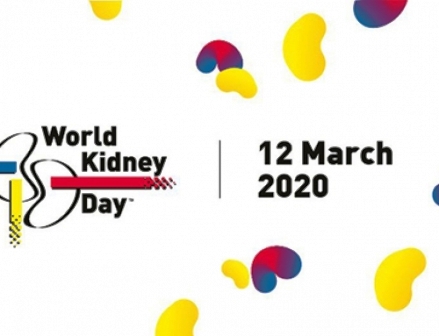-
It’s better than cure, for everyone, everywhere – ISN, IFKF warn
With statistics showing that one in three people (an estimated 850 million people} is at increased risk of chronic kidney disease (CKD) worldwide, the International Society of Nephrology (ISN) and the International Federation of Kidney Foundations (IFKF) say prevention remain the best way to prevent kidney failure.
On this year’s World Kidney Day (Thursday 12 March), advocates led by the International Society of Nephrology (ISN) and the International Federation of Kidney Foundations (IFKF) are raising awareness of the importance of the preventive measures and the pressing urgency pertaining to the need for increased education of populations, patients, practitioners and policy makers in effective kidney disease prevention.
This year’s campaign theme “Kidney Health for Everyone Everywhere – from Prevention to Detection and Equitable Access to Care” is about highlighting the importance of preventive interventions – be it primary, i.e., to prevent CKD onset, or secondary or tertiary, i.e., prevention of worsening early CKD or progression of more advanced CKD to end-stage kidney disease, respectively.
The costs of dialysis and transplantation consume 2%–3% of the annual health care budget in high income countries, spent on less than 0.03% of the total population of these countries . Costs that are preventable by preventing kidney failure.
Moreover, cost-effectiveness can be increased by adopting secondary prevention measures for higher risk populations such as those with diabetes mellitus and hypertension and those with rapid CKD progression.
Whilst non-targeted secondary prevention produces cost-effectiveness ratios consistently above $50,000 per life year saved 2 ; estimates suggests that this cost can be halved when management of known patients with uncontrolled diabetes and hypertension is improved .
“Primary prevention should focus on the modification of CKD risk factors and addressing structural abnormalities of the kidney and urinary tracts, and exposure to environmental risk factors and nephrotoxins” explains Professor Philip Kam Tao Li, Co-chairman of WKD Joint Steering Committee for ISN, based at Prince of Wales Hospital, Chinese University of Hong Kong.
“In contrast, in persons with preexisting kidney disease, secondary prevention, including blood pressure optimization, glycemic control and avoiding high-protein high-sodium diet should be the main goal of education and clinical interventions” adds Professor Guillermo Garcia, Co-chairman of WKD Joint Steering Committee for IFKF, based at University of Guadalajara Health Sciences Center, Mexico. He continues: “In patients with moderate to advanced CKD, management of comorbidities such as uremia and cardiovascular disease along with low-protein diet are among the recommended preventative interventions to avoid or delay dialysis or kidney transplantation.”
Prof Li, who is also the Immediate Past President of the Asian Pacific Society of Nephrology, says: “educational and political efforts are needed to proliferate the “prevention” approach”. Concretely, this means making populations aware of the risks through global communication campaigns and empowering patients through, for example, online learning platforms. Practitioners would benefit from cross-specialty training to recognize at risk patients and politicians need to prioritize integrated NCD programs and support “best buys”. “Best buys” are cost effective interventions such as screening of at-risk populations for CKD, universal access to essential diagnostics of early CKD, availability of affordable basic technologies, and essential medicines and task shifting from doctors to front-line health care workers to more effectively target progression of CKD and other secondary preventative approaches.
About the organizers of World Kidney Day: World Kidney Day is a joint initiative of the International Society of Nephrology (ISN) and the International Federation of Kidney Foundations (IFKF).
Founded in 1960, the International Society of Nephrology (ISN) is a global not-for-profit society dedicated to improving kidney care and reducing the incidence and impact of kidney disease worldwide. Through its global network and programs, ISN brings together the developing and developed world in a collaborative effort in fighting and treating kidney disease on a global scale. More information on www.theisn.org.

